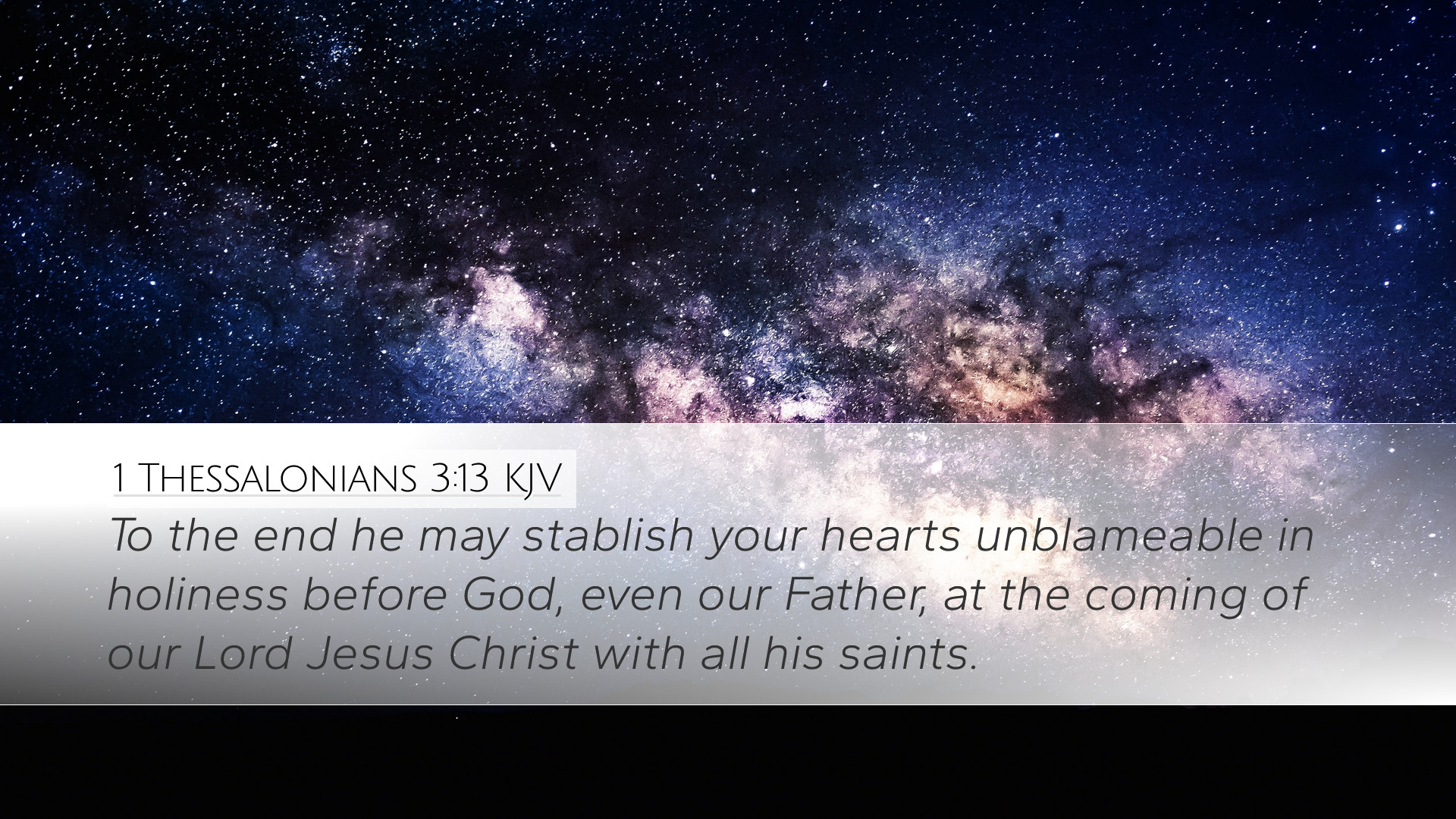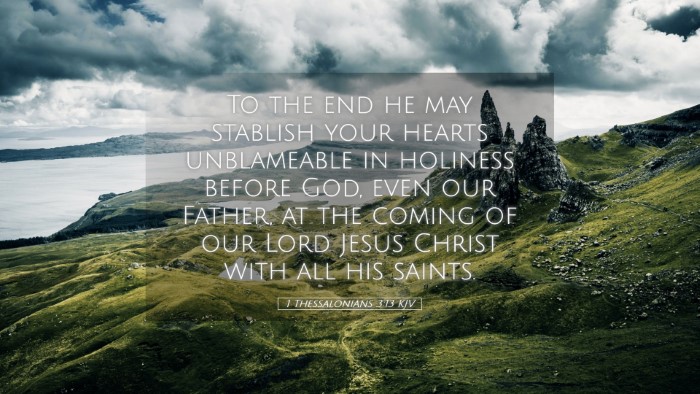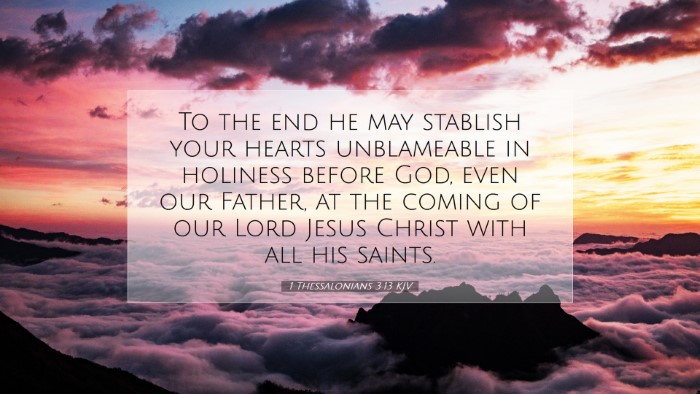Old Testament
Genesis Exodus Leviticus Numbers Deuteronomy Joshua Judges Ruth 1 Samuel 2 Samuel 1 Kings 2 Kings 1 Chronicles 2 Chronicles Ezra Nehemiah Esther Job Psalms Proverbs Ecclesiastes Song of Solomon Isaiah Jeremiah Lamentations Ezekiel Daniel Hosea Joel Amos Obadiah Jonah Micah Nahum Habakkuk Zephaniah Haggai Zechariah Malachi1 Thessalonians 3:13
1 Thessalonians 3:13 KJV
To the end he may stablish your hearts unblameable in holiness before God, even our Father, at the coming of our Lord Jesus Christ with all his saints.
1 Thessalonians 3:13 Bible Commentary
Commentary on 1 Thessalonians 3:13
Verse Context: 1 Thessalonians 3:13 states, “To the end he may establish your hearts unblameable in holiness before God, even our Father, at the coming of our Lord Jesus Christ with all his saints.” This verse encapsulates Paul's earnest desire for the Thessalonian church, emphasizing both their spiritual stability and morality as they await Christ's return.
Overview of Commentary Insights
This verse presents a dual focus: the establishment of the believers' hearts and their holiness before God. Various public domain commentaries expound on Paul's theological intentions, bringing to light various dimensions of Christian living in anticipation of Christ's second coming.
Insights from Matthew Henry
Matthew Henry highlights the importance of heart establishment. He observes that the heart is the seat of affections and thoughts, which should be firm and unwavering in faith. He emphasizes that Paul's prayer is for the Thessalonians to have a heart that is “unblameable in holiness,” which indicates a necessary alignment with God’s standards.
Henry elaborates on the notion of holiness, pointing out that this is not merely an external adherence to the law but an inner transformation that manifests itself in righteous living. The pursuit of holiness should be a defining characteristic of the Christian life.
Furthermore, Henry comments on the anticipation of Christ's return. He asserts that the early church lived with an acute awareness of the second coming, which compelled believers to live righteously. The phrase “with all his saints” denotes a community aspect; believers are not alone in this endeavor, and their hope is communal as well as personal.
Insights from Albert Barnes
Albert Barnes offers an analysis of the linguistic structure and theological implications of this verse. He notes that “establish your hearts” suggests a process of strengthening that is necessary for enduring tribulation and retaining faith amidst adversity.
- Heart Establishment: Barnes emphasizes the necessity of being 'established'—a term reflecting firmness and resoluteness in faith.
- Unblameable in Holiness: He explains that being 'unblameable' refers to being beyond reproach before God, which is a significant aspiration for any believer.
- The Role of God the Father: Barnes points out the importance of God’s parental role in guiding the believer towards holiness, fostering an image of a caring Father who desires the best for His children.
Moreover, Barnes underlines the eschatological hope encapsulated in the phrase “at the coming of our Lord Jesus Christ.” He assures believers that their efforts in holiness will not go unnoticed and will be vindicated at Christ’s return.
Insights from Adam Clarke
Adam Clarke brings a comprehensive understanding of Pauline theology to his commentary. He remarks that, particularly in this verse, Paul reveals an intrinsic link between the believer’s holiness and their fruitfulness in awaiting Christ’s return.
- The Holiness Doctrine: Clarke describes holiness as both a positional and a practical reality, whereby believers stand justified before God yet must also exhibit moral purity in their lives.
- Hope and Conduct: He stresses that hope in Christ’s imminent return should effectively govern believers' conduct—encouraging them to live lives marked by love, faith, and righteousness.
- Encouragement for the Church: Clarke notes that this verse serves as motivation for collective striving toward holiness, encouraging mutual edification and holding one another accountable within the church community.
Theological Applications
This verse encourages deep introspection among believers. It raises the questions:
- How are we establishing our hearts in faith? This calls for a disciplined spiritual life—engaging in prayer, study, and community fellowship.
- Are we holding fast to holiness, both individually and collectively? The pursuit of holiness should be visible in daily actions and relationships.
- How does the anticipation of Christ’s return influence our present actions? A genuine expectation of Christ's return should motivate believers to live in a manner consistent with their faith.
Conclusion
In summary, 1 Thessalonians 3:13 provides a profound exhortation to believers to pursue holiness while remaining steadfast in their hearts as they await the coming of the Lord. The insights from Henry, Barnes, and Clarke collectively encourage an understanding of the inner spiritual life characterized by integrity, faithfulness, and community support. As we reflect upon this verse, may it inspire us to seek a deeper relationship with God and to cultivate a more robust ecclesiological commitment to holiness and love.


